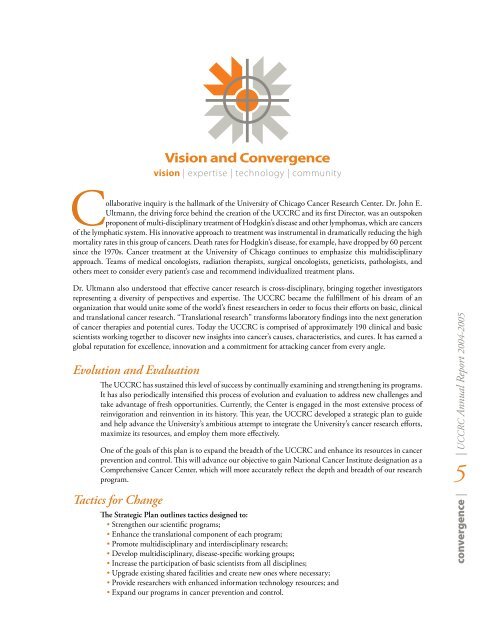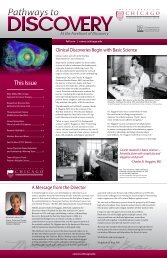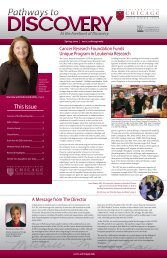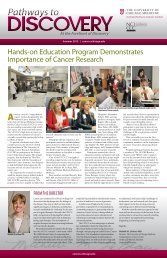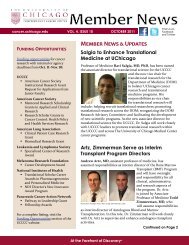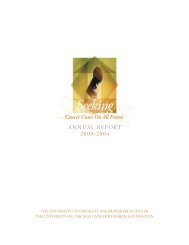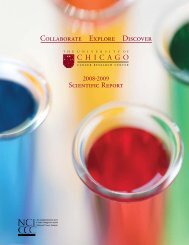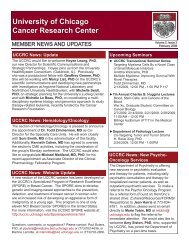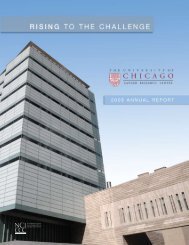convergence - The University of Chicago Medicine Comprehensive ...
convergence - The University of Chicago Medicine Comprehensive ...
convergence - The University of Chicago Medicine Comprehensive ...
- No tags were found...
Create successful ePaper yourself
Turn your PDF publications into a flip-book with our unique Google optimized e-Paper software.
Vision and Convergence<br />
vision | expertise | technology | community<br />
Collaborative inquiry is the hallmark <strong>of</strong> the <strong>University</strong> <strong>of</strong> <strong>Chicago</strong> Cancer Research Center. Dr. John E.<br />
Ultmann, the driving force behind the creation <strong>of</strong> the UCCRC and its first Director, was an outspoken<br />
proponent <strong>of</strong> multi-disciplinary treatment <strong>of</strong> Hodgkin’s disease and other lymphomas, which are cancers<br />
<strong>of</strong> the lymphatic system. His innovative approach to treatment was instrumental in dramatically reducing the high<br />
mortality rates in this group <strong>of</strong> cancers. Death rates for Hodgkin’s disease, for example, have dropped by 60 percent<br />
since the 1970s. Cancer treatment at the <strong>University</strong> <strong>of</strong> <strong>Chicago</strong> continues to emphasize this multidisciplinary<br />
approach. Teams <strong>of</strong> medical oncologists, radiation therapists, surgical oncologists, geneticists, pathologists, and<br />
others meet to consider every patient’s case and recommend individualized treatment plans.<br />
Dr. Ultmann also understood that effective cancer research is cross-disciplinary, bringing together investigators<br />
representing a diversity <strong>of</strong> perspectives and expertise. <strong>The</strong> UCCRC became the fulfillment <strong>of</strong> his dream <strong>of</strong> an<br />
organization that would unite some <strong>of</strong> the world’s finest researchers in order to focus their efforts on basic, clinical<br />
and translational cancer research. “Translational research” transforms laboratory findings into the next generation<br />
<strong>of</strong> cancer therapies and potential cures. Today the UCCRC is comprised <strong>of</strong> approximately 190 clinical and basic<br />
scientists working together to discover new insights into cancer’s causes, characteristics, and cures. It has earned a<br />
global reputation for excellence, innovation and a commitment for attacking cancer from every angle.<br />
Evolution and Evaluation<br />
<strong>The</strong> UCCRC has sustained this level <strong>of</strong> success by continually examining and strengthening its programs.<br />
It has also periodically intensified this process <strong>of</strong> evolution and evaluation to address new challenges and<br />
take advantage <strong>of</strong> fresh opportunities. Currently, the Center is engaged in the most extensive process <strong>of</strong><br />
reinvigoration and reinvention in its history. This year, the UCCRC developed a strategic plan to guide<br />
and help advance the <strong>University</strong>’s ambitious attempt to integrate the <strong>University</strong>’s cancer research efforts,<br />
maximize its resources, and employ them more effectively.<br />
One <strong>of</strong> the goals <strong>of</strong> this plan is to expand the breadth <strong>of</strong> the UCCRC and enhance its resources in cancer<br />
prevention and control. This will advance our objective to gain National Cancer Institute designation as a<br />
<strong>Comprehensive</strong> Cancer Center, which will more accurately reflect the depth and breadth <strong>of</strong> our research<br />
program.<br />
Tactics for Change<br />
<strong>The</strong> Strategic Plan outlines tactics designed to:<br />
• Strengthen our scientific programs;<br />
• Enhance the translational component <strong>of</strong> each program;<br />
• Promote multidisciplinary and interdisciplinary research;<br />
• Develop multidisciplinary, disease-specific working groups;<br />
• Increase the participation <strong>of</strong> basic scientists from all disciplines;<br />
• Upgrade existing shared facilities and create new ones where necessary;<br />
• Provide researchers with enhanced information technology resources; and<br />
• Expand our programs in cancer prevention and control.<br />
<strong>convergence</strong> | | UCCRC Annual Report 2004-2005


